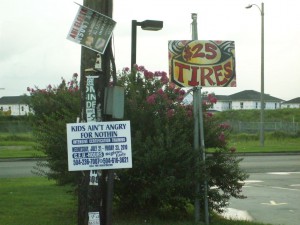We split into three crews today, on our sixth day of our New Orleans service trip. One crew went to Animal Rescue of New Orleans (ARNO), the local no-kill animal shelter. It turns out ARNO has only one paid staffer, and relies on volunteers for just about everything else. In a city where volunteers are already maxed out, it must be tough to be so reliant on volunteers. And we’ve all heard how animals had to be abandoned by those fleeing the city, so working at ARNO feels like we’re supporting the overall volunteer effort.
A recent issue of Christian Century magazine carried an article on short-term service trips. Many people who go on service trips feel strongly that they must see tangible results, regardless of what the community they’re serving happens to need:
Noel Becchetti of the Center for Student Missions tells of a local pastor in Mexico who tries to get visiting teams to help with his mission of outreach to men. Some teams, however, are dead set on building something: they want to see some (literally) concrete results. So the pastor has a wall that he has such teams work on. He has no idea what the wall will ever be or become, but building it keeps the visiting teams busy and out of his hair, and at the end of their time they can rejoice and be glad that they accomplished something tangible…. [“Misguided Missions: Ten Worst Practices,” by Mark W. Radecke, 18 May 2010 issue]
I think that many volunteers who go to New Orleans to help with the rebuilding effort think that they should literally be rebuilding, and they are disappointed if that’s not what they do. But in a stressed city like this, there’s so much to do that what’s most important is to ask the people who are in the place you’re serving what they need done — and then do it, cheerfully.
Our second crew went back to Green Light today to install compact fluorescent bulbs in people’s houses. I was on the third crew. We went back to help out the Growing Homes program, finishing up the planting that we had started yesterday. It took us all morning to finish, and when we got done Mrs. Washington fed us hamburgers and hot dogs for lunch (our vegans had to eat potato chips and wait to eat lunch). Several members of Mrs. Washington’s extended family, along with her two sons, sat down while we ate, and we had a good time talking.
After lunch, we came back to the Center for Ethical Living and did some repair work here. We also began putting mattress covers on the foam mattresses in the home-made bunk beds in our dorm rooms; we will complete that task tomorrow.
The Center staff did a final debriefing session with us before dinner. They asked us each to say a high point and a low point of the past week, and then say what we’re going to bring back home with us. What I said was this: my high point was the people, both the New Orleans residents like Mrs. Washington whom I got to meet, and the other relief workers whom I met here (Americorps volunteers, people who moved down here to help rebuild, etc.), and also the people in our group whom I got to know better; my low point was the day I didn’t drink enough water and got overheated; and what I’m going to bring back with me is ideas of what we can do where we live, considering how bad the finances of the state of California are, and how many state-funded services (schools, etc.) are being cut.
Tonight, everyone else is going to the French Quarter to eat begniets and see the sights. I’m going to head off early to bed; I’ll be getting up in the middle of the night to drive one of our people to the airport because she has to leave a day early.

